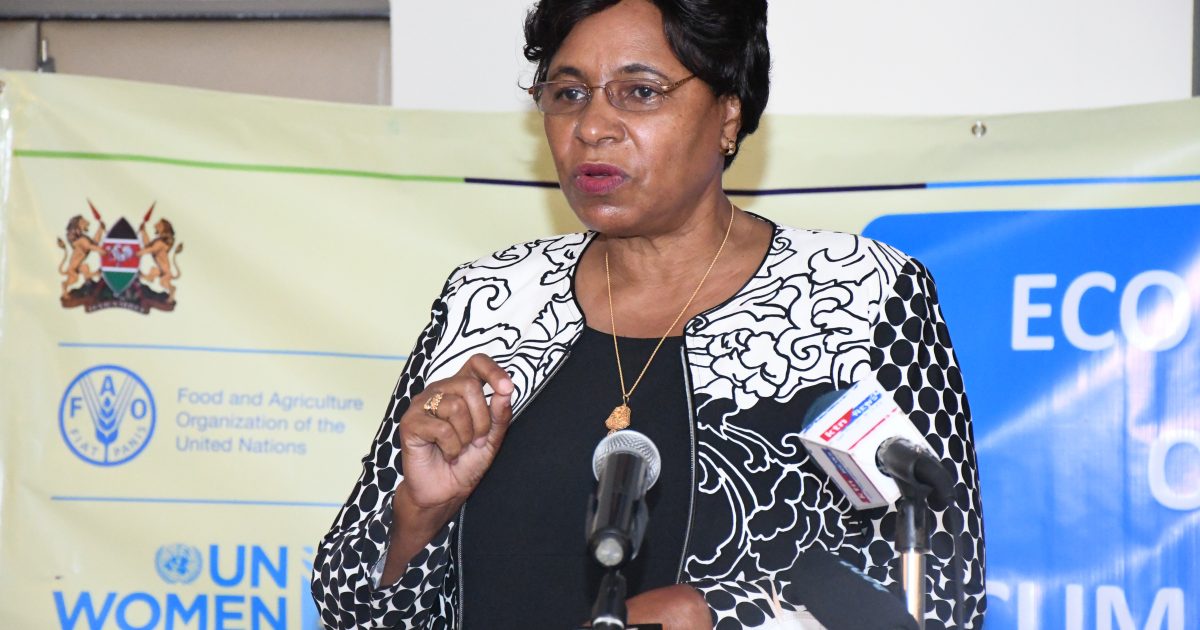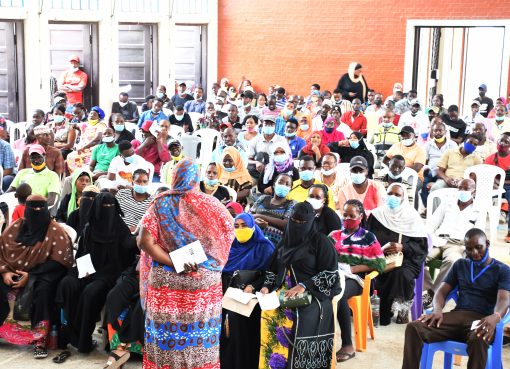The Food and Agriculture Organization (FAO) and United Nation Women (UN) have formally kicked off a Shs 7 million project aimed at strengthening women’s capacity to meaningfully engage in Climate Smart Agriculture (CSA)
The four-year project in three Arid and Semi-Arid Lands (ASAL) Counties of Laikipia, West Pokot and Kitui is funded by the Korea International Corporation Agency (KOICA).
The project seeks to promote an approach to agricultural transformation in a changing climate in Kenya’s ASAL regions that ensures gender-sensitive responses to climate change and to resilience building.
Ministry of Public Service and Gender Cabinet Secretary Prof. Margaret Kobia lauded the project as a timely intervention especially at this time when Kenya is recovering from the locust invasion and grappling with the impact of climate change on food security and household incomes.
Kobia noted that Kenya’s Vision 2030, identifies agriculture as one of the key movers to deliver the 10 per cent annual economic growth rate envisaged under the economic pillar.
“Under the Big 4 Agenda, President Uhuru Kenyatta’s administration has laid great emphasis on the agricultural sector contribution aimed at chieving 100 per cent food security and nutrition,” said Kobia who presided over the launch of the project held in Nairobi.
She further stated that the sector has high employment potential and is capable of absorbing many women who are currently faced with high unemployment rates, noting that, 60 per cent of all unemployed and underemployed youth are female.
“The objectives of the programme are wholly fully aligned with relevant Governments policies and will go a long way to advance progress made towards women empowerment, gender equality, climate resilience, economic grow job creation, and food security and overall. economic growth,” she added.
The CS further stated that it was her hope that through the project, more young women will be encouraged to adopt agriculture as an occupation or business so as to sustain the positive outcomes of the programme when evaluated.
Ambassador of the Republic of Korea to Kenya H.E Choi Yeonghan, said that Korea International Cooperation Agency (KOICA) supports agriculture and food security, among other areas, with the aim of reflecting Korea’s comparative advantage, while at the same time corresponding to the SDGs, as well as the priority for the development of our partner countries.
“Especially, KOICA Kenya strives to establish a sustainable basis of food value chain; improve people’s living environment; and push forward with inclusive and sustainable regional development in a bid to improve the welfare of the rural community in Kenya. As change drivers, KOICA works towards realizing the social value globally in collaboration with the UN agencies and other partners,” observed the Ambassador.
FAO representative to Kenya Mrs Carla Mucavi noted that they recognize that food security starts and ends with women, who account for 60-75 percent of the labour force in smallholder agriculture in Kenya, as well as in many other countries in Africa.
“It is therefore very crucial to leave no one behind in the quest to attaining food and nutrition security for all,” she said.
She stated that FAO is working in collaboration with UN Women in this project as a strategic partnership to realise the UN’s Sustainable Development Goals (SDGs) that focus on gender equality (SDG 5), zero hunger (SDG 2), no poverty (SDG 1) and climate action (SDG 13) among many other national, regional and global goals.
Mucavi observed that within the four-year period the project will increase the technical know-how of farmers on CSA approaches, unlock market driven value-chains for women and improve their capacity to participate in productive land and water management, as well as increase the women in agribusiness’ access to finance.
UN Women Country Representative to Kenya Anna Mutavati on her part said that women economic empowerment is central to achieving gender equality, adding that it is therefore paramount that, in a country where women feature so heavily in the agriculture sector, related programmes support women.
“Women are disproportionately affected by overlapping challenges of poverty and food insecurity caused by floods, droughts, locusts and now COVID. Incorporating climate smart approaches will contribute to building women’s resilience, self-reliance and economic security,” she noted.
The UN Representative pointed out that evidence shows that adoption of CSA practices significantly mitigates the frequent climate shocks smallholder farmers encounter during droughts and floods, and in times of food and pasture scarcity.
“This CSA project will ensure the 2,400 beneficiary – which include both women and men – will achieve economic progress that will sustain beyond the project, with impact-orientated activities and monitoring,” said Mutavati.
In Kenya, women account for 75 per cent of the labour force in smallholder agriculture, manage 40 per cent of small farms, and play a major role in food preparation and storage. However, women already face multiple structural challenges: even though they are the main producers of food, women in agriculture own fewer assets and have access to less land, fewer inputs, and fewer financial and extension services than men, limiting their rights, potential, and well-being, as well as their capacities to build climate resilience.
Agricultural production remains the main source of income for most rural communities, and the increased risk of crop and livestock production failure, associated with increased frequency of extreme climate events, poses a major threat to food security and poverty reduction.
Adaptation of the agricultural sector to the adverse effects of climate change is thus an important priority, to protect and improve the livelihoods of the poor and to ensure food security.
With little resilience to climatic changes, economic and social shocks, smallholder farmers in ASAL counties have become extremely vulnerable to food insecurity. In addition to that, climate change increases the uncertainty as most of the households are unaware of the fast-changing environment.
By Alice Gworo





